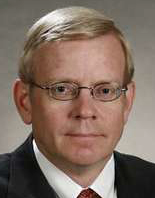Torrey: Recommendations for Holiday Workers' Compensation Book Giving
Friday, December 7, 2018 | 0
I boldly offer here recommendations for holiday book giving for that special lawyer or judge in your life (or, for that matter, you or some other person) who is keen to enhance his knowledge about our field and/or those areas with which we often interface.

David B. Torrey
The writer Paul Bowles once indicated that he learned how to speak Spanish by studying a new word every morning. He’d paste the word on a slip of paper and tape it to the mirror, better to review while he shaved. My own strategy for muscling up on comp knowledge is to utilize the bus ride to and from work as a dedicated period of reading and annotation.
It’s also a balm for our bleak and the babies-are-crying ride across the ridges and slopes above the skyscrapers here in Pittsburgh, a trip I have dubbed, at least on the bad days, the Voyage of the Damned.
Anyway, empowered by that approach, here are books I read from which, over the past year, I learned the most. I am pleased to recommend them to you.
The changing nature of work is always on the minds of workers’ compensation professionals, who wonder how things like misclassification, artificial intelligence and automation will change work, both for us and for the workers whose injuries give rise to the need for the program.
Many a wonky provocateur has appeared at seminars of late peddling anxiety about the future of work — and workers’ compensation itself. Indeed, such talking heads suggest, even judges can be eliminated by introduction of the innovative “Justice 2000” computer.
In any event, three books will better help you sort the wheat from the chaff on this topic. "The Fissured Workplace: Why Work Got So Bad for So Many and What Can Be Done to Improve It," by David Weil, is the best place to start. Weil explains in general how work has changed over the recent decades, emphasizing the tendency of large companies to contract out all aspects of commerce, other than their core competencies.
Louis Hyman digs deeper in his book, "Temp: How American Work, American Business and the American Dream Became Temporary," setting forth dual (but related) narratives accounting for the growth of staffing agencies and the glamorous business consultancies that recommend them so heavily.
As for innovations in communications, the rise of the gig economy and the role of employment law, the best book right now for the lawyer is "Humans as a Service: The Promise and Perils of Work in the Gig Economy," by law Professor Jeremias Prassl.
As a lawyer, I never did figure out how to effectively cross-examine a chiropractor. Resources have always been thin on that topic, and the conventional medical literature to this day largely excludes reference to chiropractic theory and practices.
Considering feuds and lawsuits going many decades back, critical analysis of chiropractic by allopathic physicians seems nowhere to be found.
One will better be equipped to understand chiropractic generally, and how it has been and is subject to criticism, by way of Holly Folk’s "The Religion of Chiropractic: Populist Healing From the American Heartland." This book was also a pleasure to read — a new revelation on every page.
I did not know, for example, that the original Dr. Palmer, father of chiropractic and the namesake of the top chiropractors’ school, also sold goldfish out of a wheelbarrow.
On the topic of things medical, an invaluable book is "Teeth: The Story of Beauty, Inequality, and the Struggle for Oral Health in America," by Mary Otto. Here the author persuasively establishes that many of our disempowered citizens are held back (and even mortally endangered) by poor dental health. She finally provides (for me, anyway), the answer for why Medicare does not cover dental treatment and why so few dentists will accept Medicaid patients.
For the real student of the law who wants to know how principles of American evidence law were first derived from the cases and comprehensively cataloged, I recommend Andrew Porwancher’s "John Henry Wigmore and the Rules of Evidence: The Hidden Origins of Modern Law."
Meanwhile, for the lawyer or judge who wants a concise, updated evaluation of the workers’ compensation system from the social insurance economist’s point of view, the best book is by H. Allan Hunt and Marcus Dillender, "Workers’ Compensation: Analysis for its Second Century."
There is poetry on my list of recommendations. West Virginia University (my alma mater) in 2018 republished the long modernist poem "The Book of the Dead," by Muriel Rukeyser.
This is an account in verse, originally published in 1938, of the terrible Hawk’s Nest Tunnel tragedy of the early 1930s, where hundreds of transient laborers, mostly African-American and engaged in building a tunnel, perished of acute silicosis. The new edition features a valuable contextualizing introduction by West Virginia writer Catherine Venable Moore.
David B. Torrey is adjunct professor of law at the University of Pittsburgh School of Law and a workers’ compensation judge with the Pennsylvania Department of Labor & Industry. This entry is republished from the Workers' Compensation Law Professors blog, with permission.







Comments